新概念课堂笔记 第一册 Lesson 49-50-学习文档
新概念第一册Lesson49-50

tell sb to do sth. 告诉某人做某事 1.Tom的妈妈告诉他去清洁卧室。 Tom's mom tells him to clean the bedroom. 2.我的姐姐告诉我去买一些牛排。 My sister tells me to buy some steak.
3.老师告诉我们去做我们的家庭作业。 The teacher tells us to do our homework. 4.她的妈妈告诉她不要看电视。 Her mother tells her not to watch TV.
eg. The teacher tell you to remember this sentence. You should tell him to clean the floor.
1. 我妈妈叫我去做作业。 eg. My mother tell me to do the homework.
tell sb not to do sth. 告诉某人不要做某事 eg. My father tell me not to play the computer
Text
• BUTCHER: Do you want any meat today, Mrs.Bird?
• MRS. BIRD: Yes, please. • BUTCHER: Do you want beef or lamb? • MRS. BIRD: Beef,please. • BUTCHER: This lamb's very good. • MRS. BIRD: I like lamb, but my
1.我要给孩子们讲这个故事。 eg. I will tell the children this story.
新概念第一册49-50
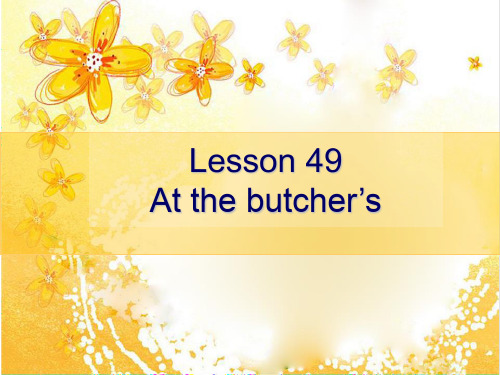
★ butcher n. a person who sells meat
e.g.: The old man is a butcher .
at the butcher's 在肉店 a place where you can buy meat
eg: The boy is at the butcher's . He wants to buy some meat .
1.▲ speak作及物动词,意为“说”“讲”,其宾语 常是某种语言。如:speak French说法语; 2.表示说到什么人或事,须用介词about/ of /on引出 的短语。如:They all spoke on folk music. 3.speak也作不及物动词,主要表示说话的本能和方 式,发言等。例如: The baby is learning to speak. speak+ 语言 speak of 意为“提到、说起” speak to sb对某人讲话
▲tell意为“告诉,对…说”.告诉的内容 可以和to连用 作及物动词,如: I can’t tell the bad news to you. =I can’t tell you the bad news. My mother tells me to buy some fruit. tell the truth 说真话 tell a lie说谎 tell the time “报时“ tell a story讲故事 tell about a person / a game / a success tell sb. sth./ tell sth. to sb. tell sb. to do sth. tell : 辨别,说出区别 tell A from B tell the differences between A and B
新概念英语第一册第49-50课

• I like lamb, too. 我也喜欢小羊肉。 • Can I come, too? 我也来,行吗? • I, too, have been to Shanghai. 我也到过上海。
• either • 一般用于否定句,位于句末,前面通常有逗 号。 • too • 常用于肯定句,有时也用于疑问句,但不 能用于否定句。常见于句末,too前常有逗 号;如果不在句末,too前后都应当有逗号。 • also • 用于肯定句中,位于居中 。
speak+
speak作及物动词,意为“说”“讲”,其宾语
语言 speak to sb. speak of 意为“提到、说起”
▲tell意为“告诉,对…说”.
tell the truth 说真话 tell a lie说谎 tell the time “报时“ tell a story讲故事 tell about a person / a game / a success tell sb. sth./ tell sth. to sb. tell sb. to do sth. tell : 辨别,说出区别 tell A from B tell the differences between A and B
Truth or dare! 真心话大冒险
选择疑问句
• What would you like to drink? 你喜欢喝什么? (无限性选择) • Which/What would you prefer, tea or coffee? 茶和咖啡,你喜欢哪一种? (两项选择) • Would you like tea, coffee, or milk? 你喜欢茶、咖啡、还是牛奶? (3项选择) • Did you go there, or didn't you? 你去了那儿还是没有去?
新概念英语第一册lesson49-50
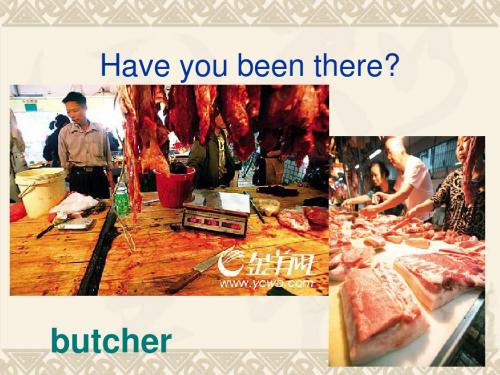
Do you want any meat? He is a dead meat! flesh [fleʃ] n. 肉
tell v.告诉,说 truth n.实情,事实 to tell you the truth ……说老实话 To tell you the truth, we can’t lower the price again. 实话说,这个牛排不是很好。 To tell you the truth , I don't want to tell you this . 说实话,我并不想告诉你这些。 tell sb sth =tell sth to sb My mother often tells me stories . = My mother often tells stories to me .
Hi, I’m Tank. Do you like ____? What do you like and don’t like?
New Words
butcher meat beef lamb husband steak
卖肉的 肉 牛肉 羔羊肉 丈夫 牛排
New Words
mince chicken tell truth either
Have you been there?
butcher
Lesson 49 At the butcher’s
beef
lamb
steak
mince
chicken n.鸡,鸡肉
hen [hen] 母鸡
chick [tʃik]小鸡
cock [kɔk] 公鸡
New words
butcher 屠夫,卖肉的 He is a real butcher! I have to go to the butcher’s. doctor – doctor’s
新概念第一册自学导读Lessons49-50
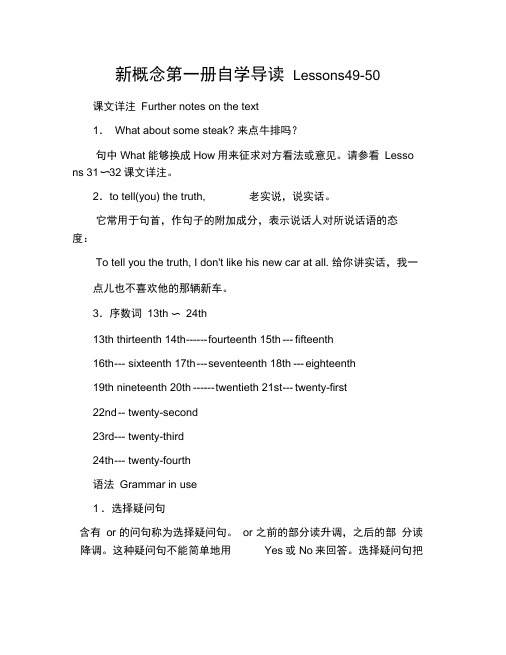
新概念第一册自学导读Lessons49-50 课文详注Further notes on the text1.What about some steak? 来点牛排吗?句中What能够换成How用来征求对方看法或意见。
请参看Lesso ns 31〜32课文详注。
2.to tell(you) the truth, 老实说,说实话。
它常用于句首,作句子的附加成分,表示说话人对所说话语的态度:To tell you the truth, I don't like his new car at all. 给你讲实话,我一点儿也不喜欢他的那辆新车。
3.序数词13th 〜24th13th thirteenth 14th ------ f ourteenth 15th --- fifteenth16th --- sixteenth 17th --- s eventeenth 18th --- eighteenth19th nineteenth 20th ------ t wentieth 21st --- twenty-first22nd -- twenty-second23rd --- twenty-third24th --- twenty-fourth语法Grammar in use1 .选择疑问句含有or 的问句称为选择疑问句。
or 之前的部分读升调,之后的部分读降调。
这种疑问句不能简单地用Yes或No来回答。
选择疑问句把选择的余地缩小在数目有限的事物、行动等上面,能够有无限性的选择、3项选择以及两项选择。
选择疑问句通常能够采用缩略形式,如:Beef or lamb? 牛肉还是羔羊肉?选择疑问句的例句如:What would you like to drink? 你喜欢喝什么?(无限性选择)Which/What would you prefer, tea or coffee? 茶和咖啡,你喜欢哪一种?(两项选择)Would you like tea, coffee, or milk? 你喜欢茶、咖啡、还是牛奶?(3 项选择)How shall we go, by bus or by train? 我们怎么走?乘公共汽车还是坐火车?Did you go there, or didn't you? 你去了那儿还是没有去?Did you or didn't you go there? 你是去了还是没有去那儿?2.一般现在时的单数第 3 人称形式(可参见Lessons 47 ~ 48语法部分。
新概念英语第一册Lesson49-50
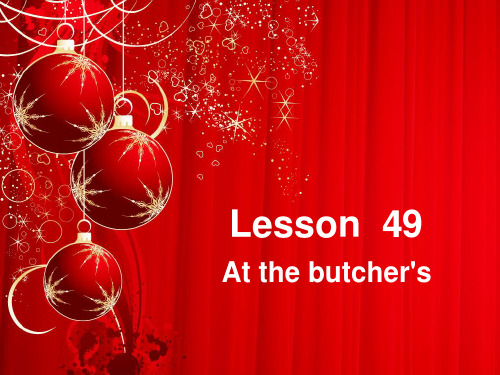
• 1.我喜欢Tank.
• I like Tank. • 2. 她喜欢Tank. • She likes Tank.
• 3. 我不喜欢猫. • I don’t like cat. • 4. 她不喜欢猫. • She doesn’t like cat.
• 5. 你喜欢狗吗? Байду номын сангаас 她喜欢狗 吗? • Do you like dog ? • Does she like dog ?
potato
Page 15
potatoes
cabbage
lettuce
pea
Page 16
bean
pear
grape
peach
Page 17
Grammar
否定和疑问句中加 助动词 do和 does
• do :I/You/We/They like • I/You/We/They don’t like • does :He/She likes • He/She doesn’t like(动词还原)
at the butcher’s 在肉店
Eg: The boy is at the butcher's . He wants to buy some meat .
Page 3
beef 牛肉(不可数)
Eg: Do you want any beef ?
steak 牛排
a piece of steak
Page 9
Mrs. Bird
butcher
What does Mrs. Bird want? She wants some beef, a piece of steak and a pound of mince.
新概念一 Lesson 49-50 课堂笔记+课堂总结
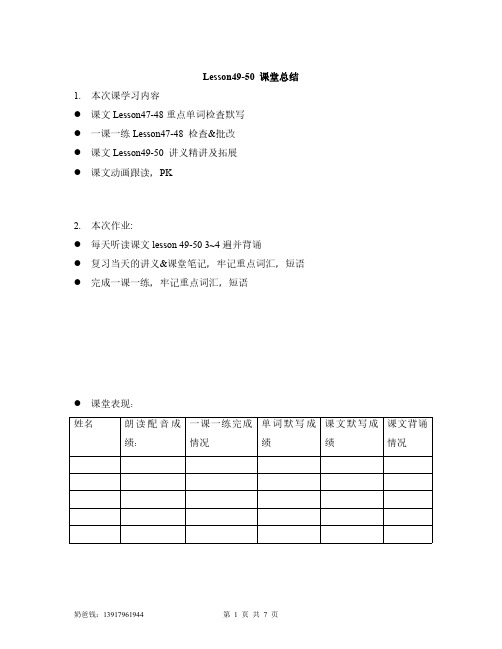
2. 本次作业: 每天听读课文 lesson 49-50 3~4 遍并背诵 复习当天的讲义&课堂笔记,牢记重点词汇,短语 完成一课一练,牢记重点词汇,短语
Chick Hen Rooster/cock
chicken, hen, cock
8. Tell e.g. My mother always tells me a story before I go to sleep.
奶爸钱:13917961944
第4页共7页
我妈妈总是在我睡前给我讲一个故事。 常用搭配: 讲故事:tell a story 说谎:tell a lie
12. Potato e.g. 土豆是一种蔬菜,不是水果 Potato is a kind of vegetable, not a fruit. 思考:potato 的复数形式:potatoes
奶爸钱:13917961944
第5页共7页
13. Cabbage 14. Lettuce 15. Pea 16. Bean 常见豆类: Soya beans:大豆 咖啡豆:coffee beans broad beans:蚕豆
奶爸钱:13917961944
第2页共7页
lamb, mince, beef, steak
4. Lamb 做羔羊肉解释:Do you want lamb? 做羔羊解释:How many lambs are there on the farm? 农场里有几只羔羊?
新概念一lesson49-50最全知识点
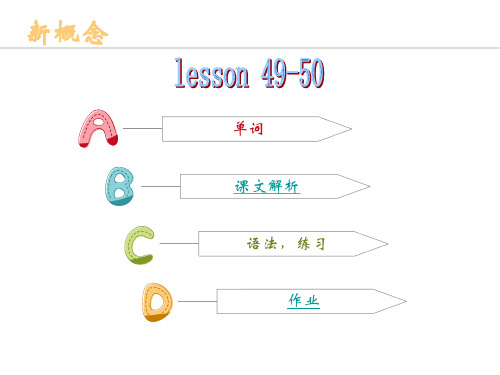
新概念
单词 课文解析 语法,练习
作业
肉类 肉类
蔬菜 蔬菜
水果 水果
we meat again
meat
!
beef
[bi:f]
steak
[steik]
lamb
S4: or • Do you want beef ↑ or lamb↓? 1.用于否定句和疑问句中.肯定句用and. 2.选择疑问句要选择其中一种答案作答 3. ↑ or ↓ or前读声调,后读降调 练习:1. Do you live in a city or a village? 2. Are you a boy or a girl?
• MRS.BIRD: And a pound of mince, too.
• BUTCHER: Do you want a chicken, Mrs. Bird? They 're very nice.
• MRS.BIRD: No, thank you.
• MRS.BIRD: My husband likes steak, but he doesn't like chicken. • BUTCHER: To tell you the truth, Mrs. Bird, I don't like chicken either!
fru:t
peə
greip pi:t∫
单词部分总结
beef,steak, lamb,mutton, fish,chicken, pork,mince
grape peach pear
新概念第一册第49-50课

13
★ chicken n.鸡,鸡肉
Hen 母鸡
Chick
小鸡
cock
公鸡
14
Husband ['hʌzbənd] (丈夫)
(妻子)
Wife
15
★ husband n.老公,丈夫
We are husband and wife. = We are a couple [‘kʌpl] 一对. 夫妻之间的称呼: honey dear darling sweet Baby sweetheart
28
• • • • •
•
•
What about some steak? 来点牛排怎么样? =How about 怎么样?/如何? You look blue. How about a movie? -You don’t like beef? What about pork? Or lamb? He is going to dance. How about you? 搞个聚会怎么样?
at the butcher ’s 在肉店 The man is at the butcher's .
12
• • • • •
I go to the butcher ’s. doctor – the doctor ’s the hairdresser’s 理发店 the dentist牙医 the dentist’s
29
He likes choice apples, but he doesn’t like choice tomatoes.
30
He likes new potatoes, but he doesn’t like new cabbages.
31
新概念英语第一册第49-50课-At the butcher's

新概念英语第一册第49-50课:At the butcher'sLesson 49 At the butchers在肉店Listen to the tape then answer this question. What does Mr. Bird like?听录音,然后回答以下问题。
伯德先生宠爱什么?BUTCHER: Do you want any meat today.Mrs. Bird?肉商:您今日要买点肉吗,伯德夫人?MRS.BIRD: Yes, please.伯德夫人:是的,我买一点。
BUTCHER: Do you want beef or lamb?肉商:您要牛肉还是要羔羊肉?MRS.BIRD: Beef, please.伯德夫人:请给我牛肉。
BUTCHER: This lambs very good.肉商:这羔羊肉很好。
MRS.BIRD: I like lamb,but my husband doesnt.伯德夫人:我宠爱羔羊肉,可我丈夫不宠爱。
BUTCHER: What about some steak?This is a nice piece.肉商:来点牛排吗?这块很好。
MRS.BIRD: Give me that piece, please.伯德夫人:就请给我那块吧。
MRS.BIRD: And a pound of mince, too.伯德夫人:再来一磅绞肉。
BUTCHER: Do you want a chicken,Mrs. Bird?They re very nice.肉商:您要买只鸡吗,伯德夫人?这些鸡很好。
MRS.BIRD: No, thank you.伯德夫人:不要了,感谢。
MRS.BIRD: My husband likes steak,but he doesnt like chicken.伯德夫人:我丈夫宠爱牛排,但他不宠爱鸡。
BUTCHER: To tell you the truth,Mrs. Bird,肉商:说老实话,伯德夫人,I dont like chicken either!我也不宠爱鸡。
Lessons 49-50新概念英语第一册课后答案详解
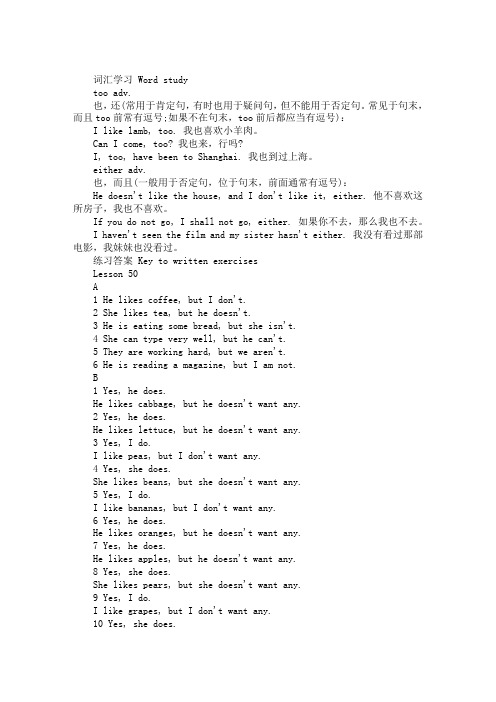
词汇学习 Word studytoo adv.也,还(常用于肯定句,有时也用于疑问句,但不能用于否定句。
常见于句末,而且too前常有逗号;如果不在句末,too前后都应当有逗号):I like lamb, too. 我也喜欢小羊肉。
Can I come, too? 我也来,行吗?I, too, have been to Shanghai. 我也到过上海。
either adv.也,而且(一般用于否定句,位于句末,前面通常有逗号):He doesn't like the house, and I don't like it, either. 他不喜欢这所房子,我也不喜欢。
If you do not go, I shall not go, either. 如果你不去,那么我也不去。
I haven't seen the film and my sister hasn't either. 我没有看过那部电影,我妹妹也没看过。
练习答案 Key to written exercisesLesson 50A1 He likes coffee, but I don't.2 She likes tea, but he doesn't.3 He is eating some bread, but she isn't.4 She can type very well, but he can't.5 They are working hard, but we aren't.6 He is reading a magazine, but I am not.B1 Yes, he does.He likes cabbage, but he doesn't want any.2 Yes, he does.He likes lettuce, but he doesn't want any.3 Yes, I do.I like peas, but I don't want any.4 Yes, she does.She likes beans, but she doesn't want any.5 Yes, I do.I like bananas, but I don't want any.6 Yes, he does.He likes oranges, but he doesn't want any.7 Yes, he does.He likes apples, but he doesn't want any.8 Yes, she does.She likes pears, but she doesn't want any.9 Yes, I do.I like grapes, but I don't want any.10 Yes, she does.She likes peaches, but she doesn't want any.。
新概念第一册Lesson49&50

Do your parents like choice grapes?
•Yes ,they do. They like grapes, but they don’t want any.
Does your grandma like ripe bananas?
Yes,
she does.
She likes ripe bananas, but she doesn’t want any.
husband n. 丈夫 truth
n. 实情
tell the truth
tell v. 告诉
either adv. 也(用于否定句)
Listening comprehension
What does Mr. Bird like?
Text
BUTCHER:
Mrs.Bird? MRS. BIRD: Yes, please. BUTCHER: Do you want beef or lamb? MRS. BIRD: Beef,please. BUTCHER: This lamb's very good. MRS. BIRD: I like lamb, but my husband doesn't .
Practice: The Simple Present Tense
Does the girl like coffee?
No, she doesn’t.
I think she likes tea very much. tea Does the lady like tea?
I’m afraid she doesn’t like tea.
Text
MRS.
BIRD: No, thank you. MRS. BIRD: My husband likes steak, but he doesn't like chicken BUTCHER: To tell you the truth, Mrs. Bird, I don't like chicken either !
新概念英语第一册第49-50课-At the butcher's

新概念英语第一册第49-50课:At the butcher'sLesson 49 At the butcher's在肉店Listen to the tape then answer this question. What does Mr. Bird like?听录音,然后回答问题。
伯德先生喜欢什么?BUTCHER: Do you want any meat today.Mrs. Bird?肉商:您今天要买点肉吗,伯德夫人?MRS.BIRD: Yes, please.伯德夫人:是的,我买一点。
BUTCHER: Do you want beef or lamb?肉商:您要牛肉还是要羔羊肉?MRS.BIRD: Beef, please.伯德夫人:请给我牛肉。
BUTCHER: This lamb's very good.肉商:这羔羊肉很好。
MRS.BIRD: I like lamb,but my husband doesn't.伯德夫人:我喜欢羔羊肉,可我丈夫不喜欢。
BUTCHER: What about some steak?This is a nice piece.肉商:来点牛排吗?这块很好。
MRS.BIRD: Give me that piece, please.伯德夫人:就请给我那块吧。
MRS.BIRD: And a pound of mince, too.伯德夫人:再来一磅绞肉。
BUTCHER: Do you want a chicken,Mrs. Bird?They 're very nice. 肉商:您要买只鸡吗,伯德夫人?这些鸡很好。
MRS.BIRD: No, thank you.伯德夫人:不要了,谢谢。
MRS.BIRD: My husband likes steak,but he doesn't like chicken. 伯德夫人:我丈夫喜欢牛排,但他不喜欢鸡。
- 1、下载文档前请自行甄别文档内容的完整性,平台不提供额外的编辑、内容补充、找答案等附加服务。
- 2、"仅部分预览"的文档,不可在线预览部分如存在完整性等问题,可反馈申请退款(可完整预览的文档不适用该条件!)。
- 3、如文档侵犯您的权益,请联系客服反馈,我们会尽快为您处理(人工客服工作时间:9:00-18:30)。
新概念英语课堂笔记第一册Lesson 49-50
husband
【用法】n. 丈夫
【词组】husband and wife 夫妇
tell
【用法】v. 告诉;吩咐;讲述;辨别
【词组】tell sb. to do sth. 吩咐(告诉)某人做某事tell sb (about) sth. 告诉某人(有关)某事
tell sb. a story = tell a story to sb. 给某人讲故事
tell the difference between A and B 分辨A 与B之间的不同
truth
【用法】n. 实情;真相;事实(不可数)
【词组】To tell you the truth 实话说
【扩展】true adj. 真实的;真正的
either
【用法】adv. 也(用于否定句)
【辨析】also, too, either ——也
also 常用在肯定句或疑问句的句中
too 常用在肯定句或疑问句的句尾
either 常用在否定句的句尾
e.g. I also write short stories. 我也写短篇小说
Do you also want to have a look? 你也想看看吗?
He likes China, too. 他也喜欢中国。
Are you in Grade 3, too? 你也在三年级吗?
She is not a Japanese, I’m not, either. 她不是日本人,我也不是。
My sister doesn’t like this song, either. 我妹妹也不喜欢这首歌。
meat 常用肉类名词
meat n. 肉fish n. 鱼(肉)beef n. 牛肉pork n. 猪肉
mutton n. 羊肉lamb n. 羔羊(肉)chicken n. 鸡(肉)turkey n. 火鸡(肉)steak n. 牛排mince n. 肉馅
序数词13th~24th
13th----thirteenth 14th----fourteenth
15th----fifteenth 16th----sixteenth
17th----seventeenth 18th----eighteenth
19th----nineteenth 20th----twentieth
21st----twenty-first 22nd----twenty-second 23rd----twenty-third 24th----twenty-fourth
At the butcher’s
【译文】在肉店
【用法】butcher 名词,“卖肉的”,表示一种传统小作坊里的手艺人,要表示他们工作的地点,就是在前面加上the,后面加上–s,要表示在这样的地方,通常用介词at。
同样的还有:
at the hairdresser’s 在理发店at the baker’s 在面包房
at the tailor’s 在裁缝店at the dentist’s 在牙科诊所
at the doctor’s 在诊所
But my husband doesn’t.
【译文】可我丈夫不喜欢。
【用法】本句是省略说法,完整结构为:But my husband doesn't like lamb.
doesn't = does not
What about some steak?
【译文】来点牛排怎么样?
【用法】(1)what about 意为“……怎么样?”,后面常常直接跟名词或名词词组,也可跟动名词。
用来征求对方的看法或建议。
how about也是此意,二者可互换使用。
比如:
My mother is a teacher, what about(how about)your mother? 我妈妈是一名老师,你妈妈呢?
What about going swimming? 去游泳怎么样?
(2)本句是一个疑问句,但仍然用了some,而没用any,是因为本句是表示希望从对方那里得到肯定的答复,征求建议,而不单纯是提出问题。
这是some的一种特殊用法。
比如:
Would you like some milk? 你想喝点牛奶吗?
Would you please lend me some money? 你能借我点钱吗?
This is a nice piece.
【译文】这块很好。
【用法】piece “块儿,片儿”等,a piece of 是一个量化词组。
本句的完整说法为:This is a nice piece of steak. 省略了steak。
steak是不可数名词,前面需要用量化词组来修饰。
形容词nice 用来修饰名词piece。
And a pound of mince, too.
【译文】再来一磅肉馅。
【用法】原句为:And I want a pound of mince, too. / And give me a pound of mince, too.
mince 是不可数名词,不能在前面直接加a,所以用一个表示量的词组a pound of来修饰mince。
pound 是可数名词。
详见41-42课。
To tell you the truth, Mrs. Bird, I don’t like chicken either!
【译文】说老实话,伯德夫人,我也不喜欢鸡肉。
【用法】to tell you the truth是个插入语,意思是“说实话”、“老实说”,常常放在句首,也可放在句中。
表示说话人的一种态度。
同义的句子还有:To be honest. 说实话。
选择疑问句
【介绍】提出两种或两种以上的情况,用or(或者)来连接,要求对方选择一种情况回答,这种问句叫做选择疑问句。
回答不能用yes或no,语调一般是第一种选择用升调,最后一种选择用降调。
选择疑问句可分为一般选择疑问句和特殊选择疑问句两种。
【用法】(1)一般选择疑问句
句型:一般疑问句+ or + 被选择的部分+ ?
例句:—Are you a teacher or a student? 你是老师还是学生?
—I am a student. 我是个学生。
—Do you like tea or coffee? 你喜欢茶还是咖啡?
—I like tea. 我喜欢茶。
(2)特殊选择疑问句
句型:特殊疑问句,A or B + ?
例句:—Which/What would you prefer, beef or chicken? 牛肉和鸡肉,你喜欢哪一种?
—(I prefer)chicken.
—Which is bigger, Beijing or New York? 哪个城市大些,北京还是纽约?
—Beijing is. 北京。
—When will you leave for London, today or tomorrow? 你何时动身去伦敦,今天还是明天?
—Tomorrow. 明天。
—Which colour do you like best, red, yellow or blue? 你最喜欢那种颜色,红色,黄色还是蓝色?(3项选择)
—I like blue best. / Blue. 我最喜欢蓝色。
—What would you like to drink? 你喜欢喝什么?(无限性选择)
—I’d like some orange juice. 橘子汁。
注意:选择疑问句可以有缩略形式,如:
Beef or lamb? 牛肉还是羔羊肉?。
